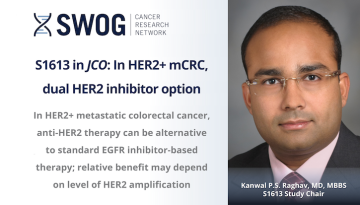Enhancing Trial Diversity: Older Patients
In 2020, the FDA issued draft guidance recommendations for increasing the number of older patients – those age 65 and up – enrolled onto cancer treatment trials. Having older patients better represented in these trials, they argued (and rightly so!), will help us better evaluate the risk/benefit profile these patients face from the treatments we test.
Historically, patients age 65 and older have been significantly underrepresented in – and sometimes explicitly excluded from – adult cancer clinical trials. Yet, we all know cancer tends to be a disease of aging, and the median age at cancer diagnosis in the U.S. is 66. Thus, the adults we term “older” actually account for the majority of all newly diagnosed cancer patients.
SWOG is working hard in this space -- launching trials, reporting results, and providing professional development opportunities. And we count leading researchers in this area among our members.
- S1918, activated last spring and led by Elizabeth Brem, MD, is the first NCTN clinical trial in lymphoma exclusively enrolling patients 75 and older, a group that accounts for almost one-third of all cases of diffuse large B-cell lymphoma (DLBCL) but which lacks a clear standard of care for the disease. This phase II/III study tests R-miniCHOP with or without azacitidine for older patients who have DLBCL or one of several other types of lymphoma.
- The distinct treatment needs of older patients were the focus of two major SWOG presentations at the ASH annual meeting in December. Anjali Advani, MD, presented results from S1318’s cohort of older Philadelphia chromosome-positive patients with acute lymphoblastic leukemia. She reported that a low-intensity treatment that included an immunotherapy agent was an effective alternative in patients who, because of age and/or frailty, were not good candidates for intensive chemotherapy.
- Also at ASH 2021, SWOG statistician Megan Othus, PhD, reported results of analyses using new statistical models her team had developed that can predict risk of early death in older, frailer patients with acute myeloid leukemia (AML) who are being treated with non-intensive therapies because they are not strong enough to tolerate intensive chemotherapy. These are the first tools to be validated as useful in predicting which patients with AML are most likely to benefit from the non-intensive therapies typically used in treating older patients.
- Age and frailty are not always co-travelers, and this was a major theme of a plenary presentation to the palliative and end-of-life care committee at the fall 2020 group meeting by SWOG member Grant Williams, MD. His team at the University of Alabama has developed the Cancer and Aging Resilience Evaluation, a schema for geriatric assessment of patients that recognizes that the challenges and limits we often associate with age can – and should – be measured independently of chronological age.
- Other educational sessions related to treating older patients are in the works for future SWOG group meetings. A major NCORP symposium on geriatric oncology had originally been planned for the spring 2020 meeting, before COVID-19 upended so many plans. The intent was to educate SWOG members about challenges and opportunities in designing research for older adults, and to engage and inspire members to develop more research protocols to address the needs of this growing population. This event is now expected to be on the agenda for our fall meeting in Chicago (thanks to support by The Hope Foundation).
- SWOG member Supriya Gupta Mohile, MD, MS, was recently honored for her work in this area with ASCO’s B.J. Kennedy Award and Lecture for Scientific Excellence in Geriatric Oncology, which recognizes an ASCO member who has made outstanding contributions to the research, diagnosis, and treatment of cancer in older patients.
- Finally, we have a number of concepts now in development focused on identifying the best treatment regimen for patients who are older and/or frail and thus not good candidates for standard, more intensive treatments, so we’ll have more studies to add to this list in the months to come.
Diversity among our clinical trial participants can be measured along many dimensions, one of which is age. SWOG has a committee focused on the particular needs of adolescent and young adult patients with cancer; we need advocates, and perhaps a formal committee, for older patients as well. Among the group of community advocates who have joined us recently is Howard Krongard, JD, an advocate representing the community of older adults with cancer.
While this community is certainly an underrepresented group in cancer research, it’s by no means a minority group among patients with cancer. Which means it’s incumbent on all of us in SWOG to be their advocates.
Other Recent Stories



